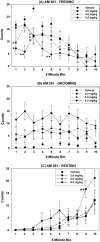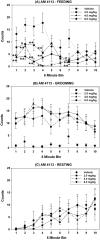The cannabinoid CB1 receptor inverse agonist AM 251 and antagonist AM 4113 produce similar effects on the behavioral satiety sequence in rats
- PMID: 18602425
- PMCID: PMC5531752
- DOI: 10.1016/j.bbr.2008.06.010
The cannabinoid CB1 receptor inverse agonist AM 251 and antagonist AM 4113 produce similar effects on the behavioral satiety sequence in rats
Abstract
Cannabinoid CB1 inverse agonists such as rimonabant and AM 251 hold therapeutic promise as appetite suppressants, but the extent to which non-motivational factors contribute to their anorectic effects is not fully known. Examination of the behavioral satiety sequence (BSS) in rats, the orderly progression from eating to post-prandial grooming and then resting, has revealed that these compounds preserve the order of events but differ markedly from natural satiation. The most notable difference is that grooming (particularly scratching) is profoundly enhanced at anorectic doses, while eating and resting are diminished, raising the possibility that the anorectic effect is simply secondary to the grooming effect. In the current design, the neutral CB1 antagonist AM 4113, which has been found to lack some of the undesirable effects of AM 251, produced nearly identical effects on the BSS as AM 251. The possibility that competition from enhanced grooming could account for the anorectic effect of AM 4113 was examined by yoking the pattern of disruptions caused by grooming in the AM 4113-treated group to forced locomotion in a different group fed in a modified running wheel. This response competition did not significantly reduce food intake. It was concluded that AM 4113, a CB1 neutral antagonist, produces the same effects on the BSS as AM 251, but that response competition from enhanced grooming may not be a sufficient explanation for the anorectic effects of CB1 antagonists/inverse agonists.
Figures





References
-
- Al-Naser HA, Cooper SJ. A-68930, a novel, potent dopamine D1 receptor agonist: a microstructural analysis of its effects on feeding and other behaviour in the rat. Behav Pharm. 1994;5:210–8. - PubMed
-
- Arnone M, Maruani J, Chaperon F, Thiebot M-H, Poncelot M, Soubrie P, et al. Selective inhibition of sucrose and ethanol intake by SR141716, an antagonist of central cannabinoid (CB1) receptors. Psychopharmacology (Berl) 1997;132:104–6. - PubMed
-
- Berridge KC, Aldridge JW. Super-stereotypy I: enhancement of a complex movement sequence by systemic dopamine D1 agonists. Synapse. 2000;37(3):194–204. - PubMed
-
- Chambers AP, Sharkey KA, Koopmans HS. Cannabinoid (CB)1 receptor antagonist, AM251, causes a sustained reduction of daily food intake on the rat. Physiol Behav. 2004;82(5):863–9. - PubMed
Publication types
MeSH terms
Substances
Grants and funding
LinkOut - more resources
Full Text Sources
Other Literature Sources

